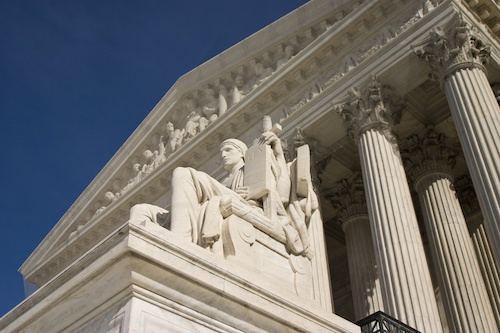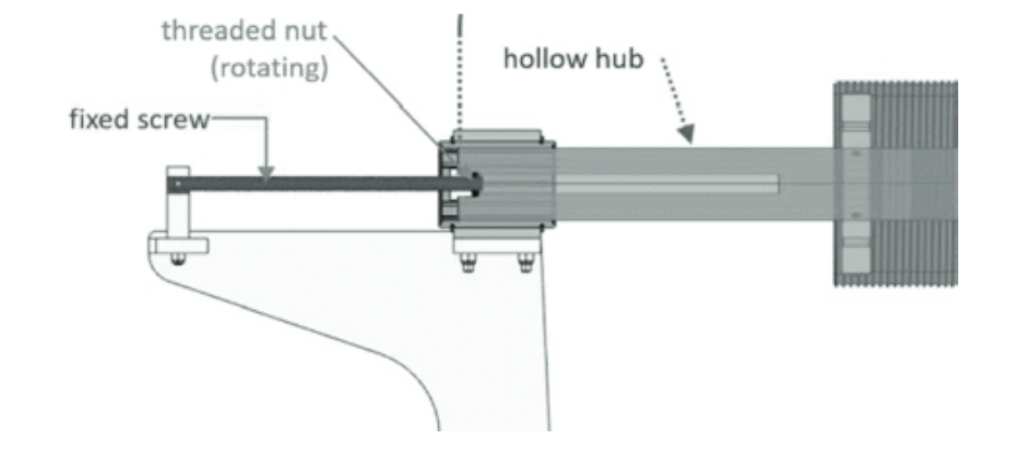“In reversing the jury’s infringement verdict ‘by sua sponte rejecting and rewriting the district court’s ‘plain and ordinary meaning’ claim construction of a common, easily understood term,’ the CAFC “resolved the infringement dispute explicitly reserved for the jury under the guise of claim construction.”
 The U.S. Supreme Court asked the Solicitor General of the United States yesterday to weigh in on a petition for writ of certiorari that claims the U.S. Court of Appeals for the Federal Circuit (CAFC) is depriving litigants of their right to trial by jury under the Seventh Amendment. The petition, filed in September by Olaf Sööt Design, LLC (OSD), asks the Court to take up the following question:
The U.S. Supreme Court asked the Solicitor General of the United States yesterday to weigh in on a petition for writ of certiorari that claims the U.S. Court of Appeals for the Federal Circuit (CAFC) is depriving litigants of their right to trial by jury under the Seventh Amendment. The petition, filed in September by Olaf Sööt Design, LLC (OSD), asks the Court to take up the following question:
“Whether the Seventh Amendment allows the Federal Circuit to reverse a jury verdict based on a sua sponte new claim construction of a term the district court concluded was not a term of art and construed to have its plain and ordinary meaning; where the Federal Circuit’s sua sponte claim construction essentially recasts a specific infringement factual question, previously decided by the jury, as a claim construction issue, to be decided de novo by the appellate court.”
In the underlying decision, the Federal Circuit reversed a jury verdict finding that Daktronics Inc.’s Vortek product infringed claim 27 of OSD’s U.S. patent No. 6,520,485. The CAFC said that the district court “failed to resolve a fundamental dispute” regarding the scope of one of the claim elements. Citing O2 Micro International Ltd. v. Beyond Innovation Technology Co., the Federal Circuit explained that “‘[w]hen the parties present a fundamental dispute regarding the scope of a claim term, it is the court’s duty to resolve it.’… Otherwise, a legal question will be ‘improperly submitted to the jury.’”
The ‘458 patent generally covers “a theater winch for moving scenery and lighting by winding and unwinding cables, which are attached to the scenery, around a drum.” Claim 27 recites “A motorized fly system winch, drum and carriage combination for raising and lowering an object, comprising” elements a-h. At issue was the scope of element h, specifically, whether the “hub” is part of the “drum” (see illustration below – drum is far right).

OSD said the hub is part of the drum, while Daktronics said the hub and drum were separate. However, the district court did not construe element h in its Markman order, failing to resolve the claim construction dispute prior to the jury trial, and thus violating O2 Micro, said the CAFC. OSD petitioned for rehearing and rehearing en banc, but the court denied the request in April 2021.
OSD’s Supreme Court petition claims that, in reversing the jury’s infringement verdict “by sua sponte rejecting and rewriting the district court’s ‘plain and ordinary meaning’ claim construction of a common, easily understood term,” the CAFC “resolved the infringement dispute explicitly reserved for the jury under the guise of claim construction.” Markman v. Westview Instruments, Inc., 517 US 370 (1996) left to the jury “all factual determinations beyond the court’s construction of the claim,” consistent with the Seventh Amendment. But, says the petition, the Federal Circuit’s 2008 O2 Micro decision has upended Markman’s “careful division between the role of the court and the role of the jury in patent infringement actions,” and caused confusion for the district courts, constituting a “trap” that has been acknowledged by dissenting Federal Circuit judges.
The present case exacerbates this problem because there was no claim construction issue on appeal, according to the petitioner. Thus, guidance from the Supreme Court on the proper application of O2 Micro is needed now.
Image rights acquired through AdobeStock.

![[IPWatchdog Logo]](https://ipwatchdog.com/wp-content/themes/IPWatchdog%20-%202023/assets/images/temp/logo-small@2x.png)

![[Advertisement]](https://ipwatchdog.com/wp-content/uploads/2024/04/Patent-Litigation-Masters-2024-sidebar-early-bird-ends-Apr-21-last-chance-700x500-1.jpg)

![[Advertisement]](https://ipwatchdog.com/wp-content/uploads/2021/12/WEBINAR-336-x-280-px.png)
![[Advertisement]](https://ipwatchdog.com/wp-content/uploads/2021/12/2021-Patent-Practice-on-Demand-recorded-Feb-2021-336-x-280.jpg)
![[Advertisement]](https://ipwatchdog.com/wp-content/uploads/2021/12/Ad-4-The-Invent-Patent-System™.png)






Join the Discussion
4 comments so far.
C. Whewell
January 16, 2022 11:28 amI figured 7th amendment considerations would show up, why did it take so long ? The filing contains some interesting points !
Greg DeLassus
January 11, 2022 03:50 pmWouldn’t the Court have to overturn Markman v. Westview Instruments, Inc., 517 U.S. 370 (1996) in order to hold for the petitioner here? Is the composition of the Court really so changed that such is a live possibility? I guess that anything can happen, but I am dubious.
Pro Say
January 11, 2022 10:58 amThere’s no way to properly apply that which is unconstitutional.
O2 is unconstitutional.
Petition granted. O2 Micro is history. Seventh Amendment affirmed.
Anon
January 11, 2022 10:05 amI wonder if there is a study out there that would verify the notion that the rate of cert grant improves tremendously when the Court asks the government to weigh in.